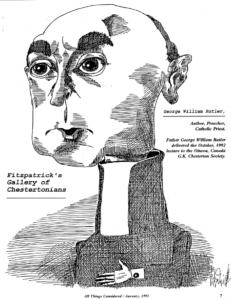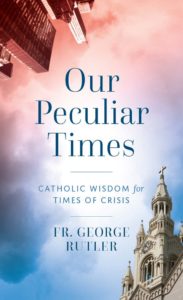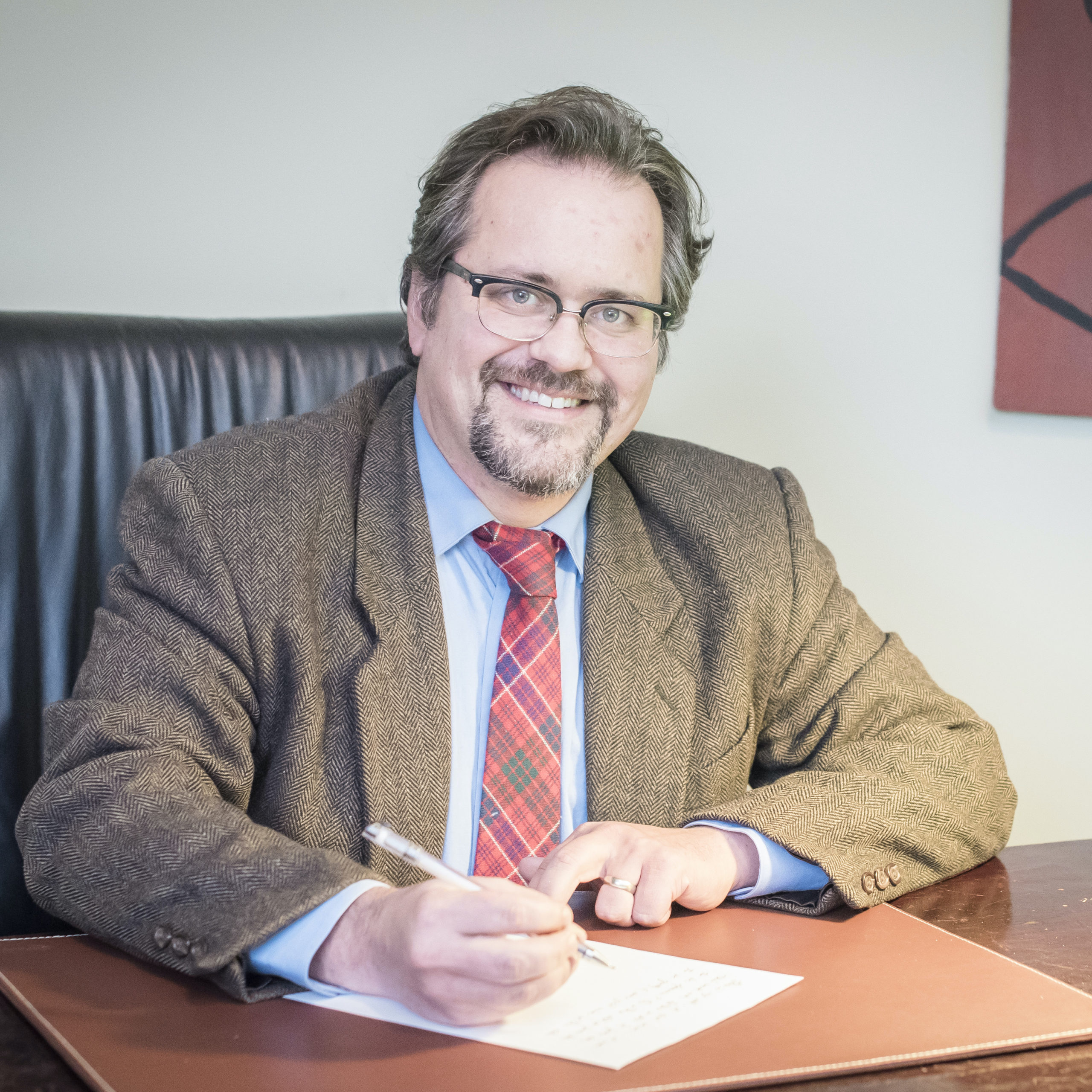 When I was a boy, every so often my father would take me to the National Press Building downtown for the gatherings of the Ottawa Chesterton Society. It was a merry, all-male club whose president used to say grinningly that GKC stood for “Girls Kan’t Come.” After enjoying a fine dinner with those well-dressed, garrulous gentlemen, I would assume a clandestine corner with pad and pen as the keynote speaker took the podium. You see, I’ve always been pretty good at drawing, and I was the society’s little party trick. While the honored guest addressed the assembly, I would secretly create a caricature of him, slip it in a frame, and then present it as a cheeky thank-you gift while the members applauded the speaker’s words and laughed at his reaction.
When I was a boy, every so often my father would take me to the National Press Building downtown for the gatherings of the Ottawa Chesterton Society. It was a merry, all-male club whose president used to say grinningly that GKC stood for “Girls Kan’t Come.” After enjoying a fine dinner with those well-dressed, garrulous gentlemen, I would assume a clandestine corner with pad and pen as the keynote speaker took the podium. You see, I’ve always been pretty good at drawing, and I was the society’s little party trick. While the honored guest addressed the assembly, I would secretly create a caricature of him, slip it in a frame, and then present it as a cheeky thank-you gift while the members applauded the speaker’s words and laughed at his reaction.
One night, a priest from New York was the guest speaker. Scoping out his features from afar, as was my custom, my heart began to hop nervously. Usually, I could peg something in my victims’ faces that I would target for exaggeration—a large nose, a square chin, a small mouth—but this subject posed a problem. The priest had the most proportioned, pale face I had ever seen. With his round head, modest mouth, and calm eyes, I had no clear foothold for unflattering accentuation.
Orthodox. Faithful. Free.
Sign up to get Crisis articles delivered to your inbox daily
Before I knew it, the priest was up at the podium and I was still up a stump. It was then that I noticed his broad Episcopal-style Roman collar, which seemed unusually large to me. The collar suddenly appeared beneath my pen. At the end of the evening, I presented the priest with the cartoon I had made: a small sphere of a bald head with the solemn serenity of a little child propped up on a tremendous giraffine Roman collar that had overtaken the portrait as the most remarkable aspect of the man. (See above, left.)
That’s how I met Father George W. Rutler when I was around twelve—a priest who has since become an even more powerful voice for Catholic culture and common sense in times that have grown exceedingly more peculiar. As all who read Crisis know well, Father Rutler is a voice crying out in the wilderness like a latter-day forerunner, proclaiming both the Kingdom that has come and that will come again. And his words, like his collar, are unabashedly Catholic. “God does not need undercover agents,” Father once said and a sober reminder it is, too, especially as we are pressured into the disguise of pandemic masks and political mantras.
Father’s most recent book, Our Peculiar Times dives directly into these turbulent waters, being a best-of collection of his writings for Crisis over the last three years. Together with the pleasure of reading Father Rutler’s “immodest proposals” on paper instead of plasma, the volume provides remarkably bolstering material for any Catholic bracing to stand against the barrage at the door and the drums in the deep. These are peculiar times, but they are not undercover times. We may be headed for the catacombs, but that doesn’t mean that we should take our lamps down from the lampstands. Father Rutler, as a priest and a writer, demonstrates what it means to stand faith foremost, colored richly and robustly with the culture that springs from it.
As our landscape is forcibly painted blue before our eyes by a duped and deliberate crowd asserting and celebrating that Joe Biden has a marvelous new suit of presidential clothes on, Catholics should prepare for courageous resistance. They should prepare to be challenged and charged as religious extremists in any matter of morality since they are presumably contaminated by “the dogma that lives loudly” in them—in us.
This liberal extreme, however, is liberal dogma, and it lives loudly on the Left—and it is gaining an upper hand. And that upper hand may well demand that faith remain a private affair—unless, of course, it is faith in the progressive agenda that believes any number of impossible relativist tenets—that sex is mutable or babies are disposable, for instance—and can do so in the public square with impunity. But Catholics must hide their faith under bushel baskets and behind closed doors, keeping it well to themselves.
Father Rutler’s words say otherwise and without apology—with terms like “bare-knuckle religion”—and his book gives the perspective that most need if they are to fight the fight that rages today and those that await us tomorrow with the textured stability that the Rock of Peter affords. Father’s essays are accessible troves of wisdom and wit woven with strands of history, theology, philosophy, political understanding, and priestly experience—and all in that delicately incisive, civilized style he commands so well. Our Peculiar Times is a handbook that should make its way to our end tables and reading stands, to take up and study in snatches, to keep our minds sharp and armed with the perspectives that might serve to make our times a little less peculiar.
I remember Father Rutler was very gracious and obviously amused, his black eyes twinkling, as he accepted my rendition of him in the Roman collar that looked more like a Roman pillar. Some of the society men remarked how fitting it was that Father Rutler’s most distinguishing feature was his priesthood—an inspiration that I, a boy, couldn’t claim any credit for. Later, I received a letter from Saint Agnes Rectory in Manhattan carrying a little poem Father Rutler wrote about the humorous picture I had drawn of him. Some thirty years later, I find that I am still marveling at—and again attempting to capture with pen—his towering Roman Catholicism. For, to this day, Father Rutler is a priest who is well represented, especially in our peculiar times, by his outstanding Roman collar.

Father Rutler’s book Our Peculiar Times
is available now from Sophia Institute Press
